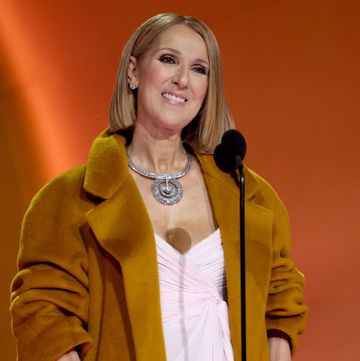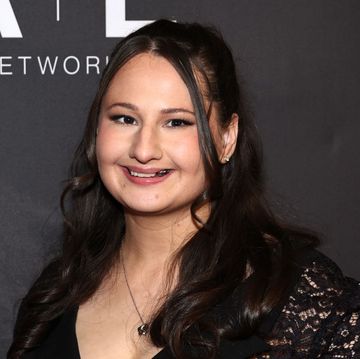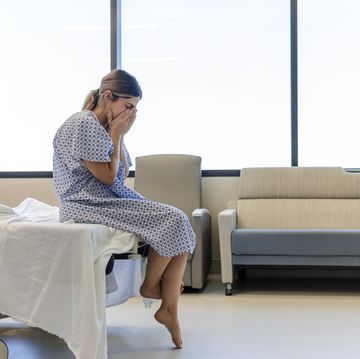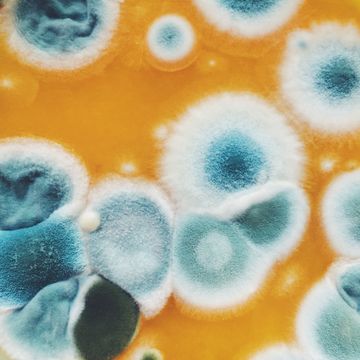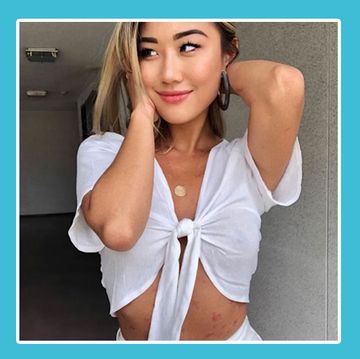You probably think that colon cancer is something that primarily affects men your dad's age and beyond—after all, colonoscopies are recommended for adults 50 and older.
But a November 2014 study published in the journal JAMA Surgery found that the amount of young men and women ages 20 to 49 in the U.S. getting colon cancer is increasing. In fact, the researchers estimate that the incidence rate of colon cancer in women ages 20 to 34 will increase by 90 percent by 2030.
Although the study authors note that more research needs to be done to determine why this increase is happening, the fact is this: 47,000 women in the U.S. are expected to be diagnosed with colon cancer in 2015 (and more than 16,000 women are expected to get rectal cancer, which is closely linked), estimates the American Cancer Society (ACS).
In honor of Colon Cancer Awareness Month, we reached out to the Colon Cancer Alliance, a national patient advocacy organization, and spoke with four women who've been diagnosed with the disease (all of whom are currently in remission). Here are their stories.
Fawn Lofton, diagnosed at age 28
At the end of 2010, Fawn, a 31-year-old personal trainer and fitness junkie who currently resides in Massachusetts, felt a lump in her lower abdomen. She also experienced irregular bowel movements and bloating.
“[My doctor] found out my protein levels were extremely low, which was bizarre because I take protein after every workout,” says Fawn, who was also found to be severely anemic. “Doctors were shocked that I was teaching fitness classes. They said people who are this anemic can’t even go up a flight of stairs.”
After her diagnosis of stage IIA colon cancer, Fawn had surgery to remove 12 centimeters of her colon and 47 lymph nodes. The cancer hadn’t spread, and Fawn didn’t need chemotherapy. “My scar healed very well,” says Fawn. “It’s visible, but doesn't stand out too much. I still proudly wear bikinis in the summertime and wear my scar with pride.”
As someone who was used to being extremely active on a daily basis and who considered herself health-conscious foodwise, it was difficult for Fawn to not immediately get back to her regular lifestyle after surgery. Fawn could only eat gentle foods that wouldn’t upset her system in the beginning, and it was at least four months after surgery until she was finally able to start getting back to her regular workout routine, let alone teach clients again.
"It was hard for me," she says. I couldn't work out, I couldn't go on walks. We joked around—me and my clients at the fitness center—it was hard for them to keep me from moving. I was [even] doing squats while I brushed my teeth."
Now, Fawn says she feels great—so great that she teaches about 10 fitness classes a week, in addition to training people individually. “I’m completely back to my normal routine,” she says.
Candace Henley, diagnosed at age 36
“I had no idea what colon cancer was,” says 47-year-old Chicago resident Candace, who started having stomach problems about six months prior to her diagnosis. Candace wasn’t able to go the bathroom and tried various treatments like milk of magnesia and an enema to relieve her constipation, but none of them worked.
She was then misdiagnosed with cancer in her uterus and ovaries—she had surgeries to remove both—before finally receiving her diagnosis of stage IIB colon cancer after doctors did blood work and found that she had lost a ton of blood (she had been bleeding from her rectum and there was blood in her stool). She had 95 percent of her colon removed, followed by a round of radiation.
Cancer wasn’t just physically taxing on Candace, a mom of five daughters—it took an emotional and financial toll on her and her family, too. “I was a bus driver in Chicago—can you imagine being asked to return to work to drive a bus after having 95 percent of your colon removed?” says Candace, who tried to go back to work but struggled with bathroom accidents. After being denied her request for another position, she had to quit. A few months later, she and her daughters moved into a friend’s house since she couldn’t afford to continue paying her mortgage.
Although Candace is still dealing with the residual effects of cancer—she was recently diagnosed with COPD (chronic obstructive pulmonary disorder), which may have been caused by radiation, and she's still getting back on her feet financially—Candace continues to help raise awareness, particularly in lower income and African-American communities (according to the ACS, African-Americans have the highest incidence of colon cancer and mortality rate from the disease in the U.S.).
That’s why Candace started an event—now in its fifth year—called Blue Hat Bow Tie Sunday. “In the African-American community, they go to the church when they have health scares,” she says. “What better way to reach out to the masses than in church?” She’s hoping to turn the event into a foundation sometime this year.
Grace De La Rosa, diagnosed at age 38
The 48-year-old former fitness competitor and model, who lives in Florida, went to her doctor after she started feeling sluggish and couldn’t make it through a workout. “At my worst, I was only able to teach 15 minutes,” says Grace. “I realized that I couldn’t even climb a set of stairs. I had to stop halfway and catch my breath. That’s when I knew something was wrong.” She also had abdominal cramping and noticed red blood when she wiped after using the bathroom. After doctors found that Grace had a golf ball-sized tumor in her colon, she had surgery and six months of chemotherapy.
“It took me a good year start feeling more like myself again and to appreciate the new me, the new normal,” says Grace, who gained 50 pounds and had to slowly incorporate physical fitness back into her life.
Grace still deals with the side effects of chemotherapy years later, most notably peripheral neuropathy—nerve damage to the hands and feet. “On good days, I may trip 10 times a day,” she says. “On bad days, I may bite the dust.” She also has degenerative arthritis in her hip, neck, and back. And most recently, she had to have an an emergency small bowel resection since a portion of her small bowel got stuck with her colon when she had her tumor removed.
This hasn’t stopped her from raising awareness about the disease through public speaking, though. “Cancer changes you,” she says. “I think that’s what fueled my fire as an advocate.”
Sonja Darrel, diagnosed at age 26
Sonja dealt with stomach pain and bleeding when she went to the bathroom for about a year before she went to the doctor and was diagnosed with stage IV colon cancer in 2012, when she was just 26 years old. “I was too embarrassed to tell anybody,” says the now-29-year-old from North Carolina. “When I had the bleeding, of course I Googled it, and colon cancer popped up, and I read about it. But I had one symptom and zero risk factors.”
When she finally did visit the doctor, she scheduled a colonoscopy for two weeks later and got her diagnosis when she woke up.
Sonja, a married mom (her daughter was six at the time of the diagnosis), also found out that the cancer had spread to her liver. She had a foot of her colon removed, as well as 60 percent of her liver. She also had chemotherapy. “I’ve always been into makeup, and I wore makeup to chemo,” says Sonja.
After she thought she was done with her treatment, Sonja’s doctor put her on one more round of maintenance chemo. “That wasn’t as hard on my body as the first round,” she says. “It didn’t make me feel sick like the first did, so I kind of eased back into feeling more like myself.”
Sonja started a Facebook group for herself and other young people with colon cancer to help others in her situation connect and get support. “At my cancer center, there was a support group for young women with breast cancer. And I thought, 'Well, I’m a young woman who doesn’t have breast cancer. Young people get other cancers, too. I really needed to find someone in the same stage of life who could relate to me directly.'”
So what does this mean for you? All of the women we spoke to stressed the importance of knowing your body and going to the doc if something feels off.
“You don’t want to ignore the symptoms,” which may include a change in bowel habits, thin stool, blood in the stool, and abdominal pain, says Mitchell Gaynor, M.D., a New York City oncologist and a clinical professor of medicine at Weill Cornell Medical College.
And while colonoscopies generally start at age 50, Gaynor says that if you have any family history of the disease, it’s recommended you get your first one when you're 10 years younger than the age at which your family member was diagnosed.
For more information on what habits can increase your risk of colon cancer, what foods will help keep your colon healthy, and more, read our feature on Page 140 in the April issue of Women’s Health, on newsstands now.
More from Women’s Health:
What You Need to Know About the Number One Cancer Killer of Women
These Are the Odds You’ll Get Cancer During Your Lifetime
10 Cancer Symptoms Most People Ignore




